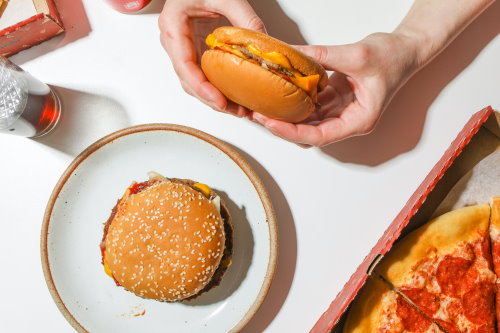As a society, we often talk about our relationships—with partners, parents, children, friends, and more. But one of our most important relationships is often overlooked, and that’s the one we have with food. Yet even those who feel pretty in touch with their diets may label their relationship with food as “it’s complicated.” Do you ever wonder if you have an unhealthy relationship with food? If you’re not sure—or even if you think it’s good and fairly healthy—examining your relationship with food is worth the effort.
We all know that food is vital—we need it for fuel, to nourish our bodies with necessary nutrients, to recover and grow, and to age gracefully. Okay, those are the physiological reasons for our relationship with food. But it goes far beyond. Food also plays a key role in memories and experiences as well as how we celebrate or connect with others. As a result, most of us have at least some attachments to certain foods. And others have deep connections, making it challenging to change how we eat—even when our health and well-being are at risk.
BREAKING: This Keeps Your Blood Sugar Below 100 - Even When You're Eating Sweets!
In other words, when it comes to our relationship with food, it really is complicated, and it includes physiological, psychological, social, existential, emotional, and environmental factors.
What is an Unhealthy Relationship with Food?
We have to admit, this can be a loaded question because what may cause one person to struggle with their relationship with food could lead another person to feel freer and better able to enjoy a variety of foods. For example, for one person, paying attention to portion sizes may feel restrictive and punishing. Yet, for another person, it may feel empowering as it helps them reach their goals with greater diet flexibility.
This is because how healthy or unhealthy your relationship is with food has little to nothing to do with diet quality, calories, macros, or how colorful. Instead, it’s all about your perception of food, the emotions that take over, the behaviors you learned, rules and restrictions you impose, and your current mindset. That’s a lot to consider as you find new and more positive ways to improve your relationship with food, especially if that relationship has been challenging.
And that relationship is complicated for a lot of people. In fact, an estimated 50 to 70% of women claim they have an unhealthy relationship with food, and many men feel the same way.
What Does an Unhealthy Relationship with Food Look Like?
Again, these criteria can depend on the person, so look at the list with curiosity about how it relates to your eating patterns and how you feel, rather than considering it set in stone.
For example, if peanuts, eggs, or shellfish are off-limits due to an allergy or if you’re choosing not to eat meat due to religious or moral reasons, that’s different from not allowing cookies, chips, or ice cream into your life because you are afraid you’ll lose control, gain weight, or feel shame, guilt, anxiety, or stress if you take even one bite.
Likewise, “free meals” (aka cheat meals or fun meals) can help some people better plan their eating while enjoying more flexibility in their diets as they reach their goals. Others, though, can feel like these types of meals lead to greater guilt and make the relationship with food even more complicated.
It’s not always the behavior that defines an unhealthy relationship with food, but rather the negative emotional baggage associated with it. And that can vary from one person to the next.
That said, some common signs may indicate it’s time to reevaluate your relationship with food. These include:
- Feeling shame, guilt, anxiety, disgust, fear, or stress when eating certain foods, eating too much, or eating something off plan.
- Feeling a lack of control or lack of freedom around certain foods.
- Labeling certain foods as bad (or good) or labeling certain foods and consuming them only as treats or rewards.
- Creating (often arbitrary) rules where certain foods or food categories are always off-limits, forbidden, or just “bad.”
- Relying on apps or calorie counters to tell you when and what to eat throughout the day (ignoring hunger cues, energy levels, and how you feel).
- Denying yourself, even if you really want to eat something or when you’re truly hungry.
- Overeating or feeling out of control, especially when you finally eat something “forbidden.”
- Regularly overeating or bingeing, often without even noticing.
- Believing you always need to clean your plate, even if you don’t like the food or are no longer hungry.
- Eating when you’re not hungry or eating mindlessly.
- Eating your emotions—such as when stressed, angry, sad, disappointed, nervous, happy, or excited—rather than experiencing the emotion.
- Defining how good or bad you are by how closely you followed your diet, macros, food limits, or the like.
- Focusing all food choices on losing weight or managing your weight or health status.
- Always trying the latest diet fad or yo-yo dieting, despite limited success with past diets.
- Allowing food to determine how good or successful you or your day has been.
- Isolating yourself and eating alone or hiding your food from others, especially if you refuse to eat with others or only eat at home to avoid falling off your diet (or to avoid feeling embarrassed by what or how much you eat).
- Feeling stressed or anxious when invited to events, dinners, or celebrations where food will be served.
- Only eating for fuel or performance, pretending that food offers no pleasure or other benefits.
- Feeling obsessed about food and your next meal—whether it’s healthy and “clean” or a secret indulgence.
- Always avoiding favorite or fun foods, even if you’re really hungry and they fill another need (such as social or emotional).
- Never veering from your prescribed portion sizes, even if it means eating when you’re not hungry or not eating enough when you really are hungry, rather than following your body’s hunger and satiation cues.
- Using exercise to “earn” a more decadent meal or drink. While it can be helpful to link food to exercise if your goal is to fuel your next workout or sporting event, using exercise to burn off a meal can quickly become associated with punishment. Exercise can be embraced for all the benefits it provides, no matter how many calories you burn.
- Judging other people based on their weight or how their bodies look—such as offering compliments on weight loss without knowing the circumstances. People can lose weight for many reasons, such as an illness, depression, an eating disorder, grief, and more, which have nothing to do with their health and well-being. There are numerous reasons to give compliments that have nothing to do with weight that can lift others up.
How to Rebuild a Healthy Relationship with Food
On the flip side, a healthy relationship with food means you can enjoy food without setting up strict rules, restrictions, or punishments. You can be flexible if your schedule changes or if dinner doesn’t turn out.
You eat when you’re hungry and stop when you’re full but not stuffed. In other words, you are able to honor your hunger. You feel relaxed about foods and enjoy eating a variety, understanding that some foods provide different benefits—from sustained energy levels to calming nourishment to fun.
Your relationship with food can grow, change, improve, or get worse over time. There’s no perfect outline or guide that tells you step-by-step how to develop a healthy relationship. For the most part, this is because everyone is unique, and what may work for you may create unhealthy behaviors for others.
One thing is true, though: the process can take time, patience, and practice and will likely continue to evolve over your lifetime.
There are, however, approaches that have worked for others that may help you improve your relationship with food. For example…
1. Listen to Your Body
Many of us eat in front of the computer, TV, or phone, or when driving or otherwise distracted. Or, we learn to eat on a schedule or when others are eating. Unfortunately, this can cause us to unlearn our body’s natural cues that tell us when to eat, when to stop, or if a certain food doesn’t make us feel our best. In other words, how to eat when you’re hungry and stop when you’re satisfied.
Learning to listen to your body’s cues can take time if you’ve been tuning out those signals. But you can get back in touch by eating mindfully, without distractions. Try it for a few meals a week and build up over time.
2. Remove the Labels
Humans are known for categorizing and generalizing nearly everything. With so much information, it can save energy to just put something into a category and leave it there. Unfortunately, labeling foods as either good or bad can lead to all sorts of unhealthy behaviors and beliefs around foods.
For example, we are more likely to judge ourselves (and others). But it can also lead many of us to want those “bad” foods even more. After all, we naturally tend to want what we think we can’t have.
Removing the labels can help decrease the guilt, shame, and stress surrounding our relationship with food. There are, of course, some foods that are higher in nutrients, but all foods (really, all foods) can be part of a healthy diet.
Rather than creating rules, or lists of foods you can or can’t eat, focus on choices and why you’re eating—for energy, for health, socially, or for pleasure.
3. Stop All or Nothing Thinking
Categorizing foods may work… for a minute. But it doesn’t take long before it becomes really difficult, if not impossible, to stay on your overly strict diet. Perhaps you have a rough day or worked extra hours, or your partner or kid has an event (that you may or may not have forgotten about) and you don’t have time to run home and prepare a meal. Or a coworker or family member is celebrating a birthday or promotion or suffering loss—with cake or a cocktail. Or you’re stuck in a car to visit family or for a road trip and you see your favorite childhood candy—but now it’s “forbidden.”
Allowing flexibility into your diet helps you stay more consistent over time. Plus, you get to decide what foods you want to eat, when, and why, rather than using some arbitrary rules that someone you’ve never met insists are the only way to eat healthfully or, conversely, that food is a free-for-all, even if you feel like crap after eating.
Ask helpful questions to determine if you really want that food. For example, are you truly hungry? Or, are you stressed, sad, or anxious? Is that food worth it to you—will it be worth it to future you? What else have you eaten? Is there something you’d rather be doing? What would allow you to just enjoy the food, without overeating?
These types of questions may allow you to have the treat after your meal when you are less hungry, so you can slow down and really enjoy it. Or, you may decide that what you need is a calming walk through the park with your pet (or another form of self-care).
4. Stop Punishing Yourself
So, you ate something that wasn’t on your plan, or you overindulged during a family meal or at the county fair. Sure, some tips can help you feel better after eating more than usual (food hangovers are all too real), but beating yourself up about what you ate isn’t only unnecessary, it’s unhealthy.
One food, meal, day, weekend, or even vacation of eating doesn’t define you, how you eat, and your relationship with food. Instead, look at your diet over weeks, months, and years to ensure it’s balanced and provides the nutrients your body needs and fuels your lifestyle—from quality proteins to colorful vegetables and fruits to healthy fats to help keep it all in perspective.
An occasional sweet treat or salty snack is much healthier than experiencing a perpetual high-alert, high-stress attitude about every bite you consume.
5. Enjoy Your Meals
No matter what diet you’re following—from Mediterranean to Keto to High Protein to Vegetarian—there are delicious foods and recipes to enjoy and look forward to, especially if you take the time to sit down and focus on your meal to embrace the flavors, colors, textures, and how the foods make you feel after eating.
Yes, food is fuel, but that’s not all it is. It’s a part of love, community, and culture. It’s also okay to eat just for pleasure—because your food tastes great, helps you socialize and connect with family and friends, or to celebrate a milestone or accomplishment.
6. Prioritize Sleep
Sleep? What does that have to do with your relationship with food? It turns out that getting the right amount of sleep is vital for making healthier choices, learning to listen to your body, and dealing with stress. When you’re well-rested, you’re more likely to eat more nutrient-dense foods, exercise more consistently, and practice self-care, all of which can impact your relationship with eating.
7. Play with Strategies to See What Works Best for You
We already know that severely restricting foods and labeling them as bad doesn’t work, but most of us have foods that can trigger us to eat more than we might need. If there are foods you enjoy but tend to overeat, you can use strategies to help you better enjoy them in moderation. For example:
- When buying sweets or crisps, only purchase individual servings or, when you get home, immediately pack them in individual serving sizes (i.e., create guardrails).
- Keep your trigger foods out of your fridge or pantry (i.e., out of sight, out of mind).
- Choose to focus on what foods you want to eat more of (rather than less of), like vegetables, fruits, legumes, or quality proteins.
- Meal and snack prep so it’s really easy and convenient to choose these options you want to eat more regularly.
- Slow down and remove distractions—focus only on the food and how it makes you feel physically as well as emotionally as you eat.
- Enjoy indulging after you’ve practiced another form of self-care to see if you eat less or, perhaps, not at all.
- Eat your favorite foods (or foods you crave) every day—to see how that impacts your food cravings. Alternatively, you can abstain from those foods to see if you want them more or less. Is that afternoon chocolate something you enjoy or just something you eat out of habit?
- Adjust your routine.
- Reframe your language. For example, instead of saying, “I can’t eat cookies because they’re bad,” change your wording to, “I tend to overeat cookies” or “eating cookies daily makes it harder for me to achieve my goals.”
- Savor your foods, taking time to really experience and enjoy every bite, using all of your senses—smell, sight, touch, and taste.
8. Work with a Professional
If you do have an unhealthy relationship with food and find that food causes you more stress and worry than enjoyment and energy, then working with a professional may help you better understand and ultimately uncomplicate your relationship.
Experienced professionals, including qualified dietitians, therapists, and other healthcare providers, can help you look at your behaviors and how you feel about them and provide tools to help you improve your food relationship.
Your Healthy Approach to Food
TRENDING: 1 Cup of This Melts Belly and Arm Fat (Take Before Bed)
At the end of the day, one of the most important aspects of any relationship is flexibility. A healthy diet shouldn’t be all-consuming and will allow you to eat just for fun.
Yes, there will be times when you crave a salad topped with a quality protein source. And a balanced diet includes a variety of foods like vegetables, legumes, quality meats and fish, and other nutrient-dense foods at least 70% of the time (preferably 80+% of the time if you’re seeking to improve your body composition). In other words, foods are on a continuum: some you want to eat more of, some you can enjoy from time to time, and finally, others you may want to enjoy less often.
Yet there are times when nothing will nourish your soul quite like an ice cream cone at your favorite childhood stand (even better if you’re sharing the experience with loved ones). Looking at your diet and eating with curiosity rather than judgment can help you determine why you’re eating and perhaps provide better ways to deal with your emotions. And, it will allow you to enjoy that tasty cookie or piece of chocolate without guilt, making your relationship with food a whole lot less complicated.









